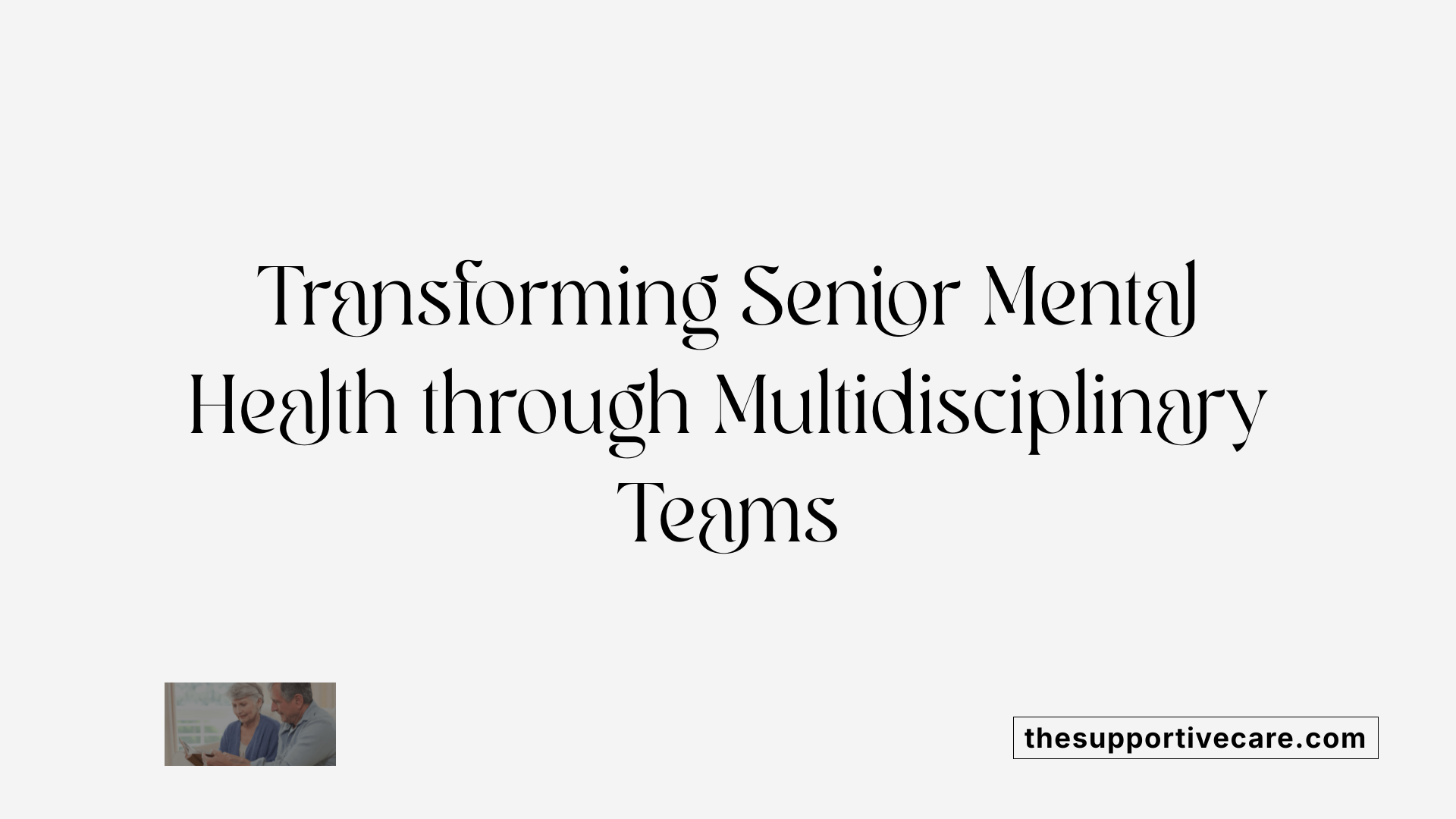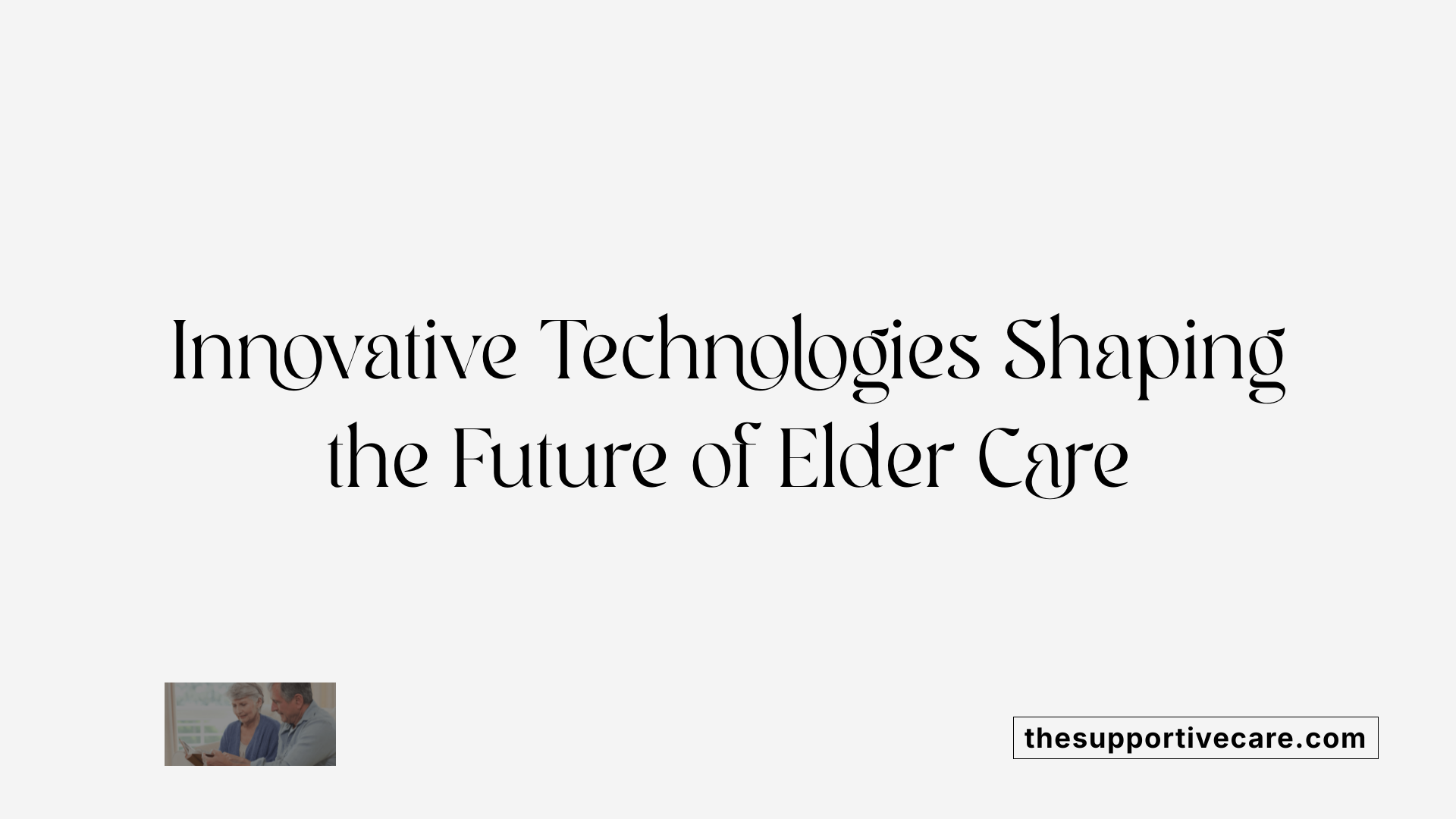Enhancing Behavioral Health Outcomes in Aging Populations
As the aging population grows, the complexity of elder care demands a coordinated, multidisciplinary approach to improve behavioral health and overall well-being. By integrating diverse healthcare professionals into comprehensive teams, elder care can be optimized to address physical, psychological, and social needs. This article explores how multidisciplinary teams (MDTs) enhance mental health outcomes for seniors, the frameworks underpinning successful integration, and the critical role these teams play in preventing elder abuse and supporting recovery.
Understanding the Role of Multidisciplinary Teams in Healthcare
What is the role of a multidisciplinary team in healthcare?
A multidisciplinary team (MDT) in healthcare is composed of professionals from three or more disciplines working together towards a common goal—improving patient health outcomes. This collaborative approach is especially vital for older adults who often present with multiple chronic conditions requiring varied expertise.
MDTs enhance decision-making by integrating diverse knowledge, ensuring a comprehensive assessment of the patient's physical, mental, and social needs. This teamwork leads to more accurate diagnoses, personalized treatment plans, and better management of complex health issues.
Effective communication among team members—such as primary care physicians, nurses, mental health professionals, pharmacists, and social workers—is fundamental. It helps prevent errors, streamlines care transitions, and reduces duplication of tests, which lowers healthcare costs.
In elder care, MDTs are crucial for addressing the intricate needs arising from physical, cognitive, and emotional challenges. They coordinate services, protect against elder abuse, and facilitate trauma-informed responses tailored to each individual.
Training, shared decision-making, and establishing protocols are essential for successful MDTs. Such structures foster trust, partnership, and balanced influence among professionals, ensuring that care remains patient-centered.
Beyond direct patient care, MDTs support preventive services like vaccinations and health screenings, empowering seniors through education and support systems. This proactive approach helps prevent hospitalizations and slow disease progression.
The use of advanced tools, including virtual simulators like Body Interact, enhances teamwork training. These platforms allow healthcare providers to practice scenarios collaboratively, improving coordination and decision-making under realistic conditions.
Overall, multidisciplinary collaboration is key to delivering high-quality, efficient, and safe healthcare for older adults, merging expertise to meet their unique and multifaceted needs.
The Impact of Collaboration on Elder Health Outcomes
Benefits of multidisciplinary collaboration
Collaborative care models involving diverse healthcare professionals—such as doctors, nurses, mental health providers, pharmacists, and social workers—bring a comprehensive approach to senior health. These teams work together to coordinate services, improve communication, and set shared goals. The result is significantly improved physical functioning (β = 2.35), mental health (β = 3.01), and overall health perceptions (β = 2.12) among older patients.
Strong communication, effective care coordination, shared goal setting, mutual respect, and patient involvement are crucial drivers that enhance team performance. When these elements are in place, the quality of life (QoL) for seniors notably increases, especially when social support from friends and family is also present. Factors like younger age, being female, married, and free from chronic illnesses further amplify these benefits.
Prevention and management of chronic conditions
Multidisciplinary teams are pivotal in preventive strategies and ongoing management of chronic diseases. Regular health screenings, lifestyle modifications, and comprehensive care plans help prevent complications and reduce hospitalizations. These teams also address complex elder abuse cases, improving response coordination and resource use.
By integrating behavioral health services into primary care, mental health outcomes—such as depression and anxiety—are also improved, leading to enhanced overall well-being. Interprofessional collaboration not only reduces medical errors but also minimizes redundant testing, thereby lowering healthcare costs.
How might multidisciplinary teams be used to promote improved health outcomes?
Interdisciplinary collaboration among healthcare professionals in a multidisciplinary team strengthens actions to prevent, diagnose, treat, and manage patients with chronic conditions and promote their health and well-being in a timely and continuous manner. This team-based approach ensures comprehensive assessment, precision in diagnoses, and holistic care, fostering better health outcomes and higher patient satisfaction.
Improving Mental Health Care through Multidisciplinary Strategies
What are the benefits of multidisciplinary teams in mental health care?
Multidisciplinary teams (MDTs) in mental health care bring together professionals from various fields, including clinicians, social workers, pharmacists, and therapists. This collaborative model allows for comprehensive and coordinated care tailored to individual patient needs.
By combining expertise, MDTs enhance diagnostic precision and create treatment plans that consider all aspects of a patient's health—physical, emotional, and social. This not only improves recovery outcomes but also boosts overall quality of life for older adults.
Effective communication and shared information within the team foster continuity of care, reducing medical errors, hospital stays, and readmissions. The involvement of patients and their families promotes engagement and emotional support, increasing satisfaction and adherence to treatment.
Additionally, working in multidisciplinary teams encourages continuous learning among healthcare providers. It can also reduce staff burnout by distributing responsibilities and providing mutual support.
Despite some challenges like coordination complexities, utilizing technology tools and establishing clear protocols helps optimize team functioning. Overall, multidisciplinary teams make mental health services more efficient and responsive, ultimately benefiting older patients’ mental well-being.
Enhancing Behavioral Health Outcomes for Seniors

How do multidisciplinary teams improve behavioral health outcomes for seniors?
Multidisciplinary teams (MDTs) play a vital role in improving mental health among older adults by offering comprehensive assessments and personalized interventions. These teams involve various healthcare professionals such as primary care physicians, mental health providers, nurses, social workers, and pharmacists. Their combined expertise helps address complex conditions like depression and anxiety effectively.
Effective collaboration within MDTs ensures better communication and coordination, enabling early detection of behavioral health issues. This proactive approach results in more accurate diagnoses and treatment plans tailored to each patient’s needs. Involving seniors and their social support networks, such as family and friends, further enhances treatment adherence and overall outcomes.
Studies show that multidisciplinary approaches in healthcare settings reduce negative events like medication errors, unnecessary hospitalizations, and adverse reactions. They also promote preventive care, health education, and lifestyle modifications, which contribute to long-term mental well-being.
Assessment and intervention strategies
MDTs utilize a variety of assessment tools to identify mental health concerns early on. Regular screenings for depression, anxiety, and cognitive decline help prioritize care. Once identified, targeted interventions—such as counseling, medication management, and behavioral therapies—are implemented.
Interventions are designed to foster independence and resilience by empowering seniors through education and self-management techniques. Moreover, integrating behavioral health within primary care settings ensures seamless support, reducing stigma and increasing accessibility.
Social support and patient engagement
Social support from loved ones plays a crucial role in mental health recovery and maintenance. Strong social networks are associated with better quality of life and emotional stability.
Engagement strategies include involving patients in decision-making processes, encouraging participation in community activities, and ensuring caregivers are well-informed about managing mental health conditions. Such involvement boosts confidence and fosters a sense of control, which are essential for positive behavioral health outcomes.
By combining assessment, tailored interventions, and robust social support, multidisciplinary teams create a holistic approach that significantly enhances mental health and overall well-being for senior patients.
Frameworks and Best Practices for Integration
Effective integration of multidisciplinary teams (MDTs) into elder care relies on structured protocols that promote collaboration and use of advanced clinical tools and technology. To maximize mental health outcomes among older adults, it is crucial to establish clear roles and shared goals within the team, supported by strong leadership that guides coordinated efforts.
Best practices include employing comprehensive assessment instruments such as the geriatric assessment and risk stratification tools. These help tailor interventions to each patient's unique needs, addressing physical, cognitive, and psychosocial aspects.
Consistent communication protocols are essential. This can involve shared electronic medical records that allow team members—primary care providers, mental health specialists, social workers, and others—to stay informed and aligned.
Leveraging technology, such as telehealth platforms and care coordination software, facilitates seamless interactions, especially when team members work across different locations. Virtual meetings and remote monitoring tools also enhance ongoing collaboration.
Regular interdisciplinary training and creation of communities of practice strengthen team culture, trust, and a shared decision-making approach. These initiatives promote mutual understanding and respect among professionals from various disciplines.
Infrastructure support, such as institutional policies that endorse collaborative practice and sustained workforce development, are foundational for scalability and sustainability.
In summary, integrating clinical protocols with modern technology and fostering a cohesive team environment ensures comprehensive and patient-centered elder mental health care.
The Role of MDTs in Preventing Elder Abuse and Enhancing Safety

How do multidisciplinary teams contribute to preventing elder abuse and related issues?
Multidisciplinary teams (MDTs) play a crucial role in safeguarding older adults by coordinating efforts across various professional disciplines. These teams include healthcare providers, social workers, law enforcement officials, legal experts, and community organizations—all working together towards a common goal.
One of the primary strengths of MDTs is their ability to identify and respond to elder abuse early. Through regular case reviews and integrated monitoring, team members can detect warning signs that may otherwise go unnoticed. This proactive approach enables timely interventions, which are vital in preventing further harm.
MDTs improve communication among stakeholders, which is essential for delivering seamless and tailored support to each elder. By sharing information, they develop personalized care and safety plans that address the multifaceted nature of elder abuse—whether physical, emotional, social, or financial.
Regular meetings and case evaluations allow for comprehensive understanding of each case. They also provide opportunities to analyze systemic issues, identify gaps in procedures, and craft prevention strategies.
Overall, through collaboration and expertise sharing, MDTs create a safer environment for older adults and effectively manage complex abuse cases. Their coordinated approach ensures that no aspect of the elder's well-being is overlooked, leading to stronger protections and improved outcomes.
The Future of Elder Care: Embracing Team-Based Approaches

How can innovations and technology shape the future of elder care?
Advances in technology are increasingly integral to multidisciplinary elder care. Telehealth platforms enable healthcare professionals to conduct virtual consultations, improving access for seniors with mobility or transportation issues. Electronic health records enhance communication among team members, ensuring everyone has current, accurate information about the patient's condition and treatment plan. Additionally, wearable devices and remote monitoring tools help track vital signs and activity levels, allowing for proactive interventions.
These technological innovations support comprehensive, coordinated care by streamlining information sharing and enabling real-time health monitoring. Such tools also foster patient engagement, allowing seniors to participate actively in their health management.
What training and workforce developments are necessary to support collaborative elder care?
Preparing a competent workforce requires ongoing training focused on interprofessional collaboration and holistic patient management. Healthcare providers need education in teamwork, communication skills, and understanding the roles of different disciplines within a multidisciplinary team.
Workforce development also involves creating specialized training programs in geriatric medicine and behavioral health, emphasizing person-centered care frameworks like the 4Ms (What Matters, Medication, Mentation, and Mobility). Supporting teams with continuous education, leadership training, and practice-based learning ensures they are equipped to address complex elder health needs.
Future outlook for multidisciplinary teams in elder care
As innovations advance and workforce training evolves, multidisciplinary teams will become more adaptive, using new tools to improve outcomes for older adults. This approach will foster personalized, efficient, and safe care models, ultimately enriching the quality of life for seniors and easing the burden on healthcare systems.
Advancing Elder Care Through Effective Multidisciplinary Collaboration
The integration of multidisciplinary teams in elder care significantly enhances behavioral health outcomes by fostering coordinated, comprehensive, and patient-centered services. From improving diagnostics and treatment to preventing abuse and promoting independence, these collaborative strategies address the multifaceted needs of older adults. As best practices and frameworks mature, supported by technological innovations and dedicated workforce training, the future of elder care will increasingly rely on effective team-based approaches. Ultimately, empowering seniors and safeguarding their well-being through multidisciplinary collaboration is essential as we strive to create a healthcare system that is responsive, efficient, and compassionate.
References
- Assessing the Impact of Multidisciplinary Collaboration on Quality of ...
- Collaborative Care for Seniors: Focusing on Prevention - ChenMed
- Elder Justice Initiative (EJI) | 1: Introduction to Multidisciplinary Teams
- Understanding and improving multidisciplinary team working in ...
- Advancing Age-Friendly Care Through Interprofessional Teams
- Assessing the Impact of Multidisciplinary Collaboration on Quality of ...
- Multidisciplinary in-hospital teams improve patient outcomes: A review


































































































